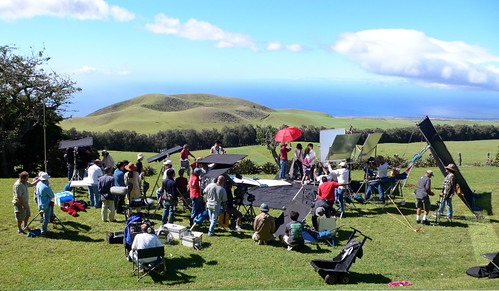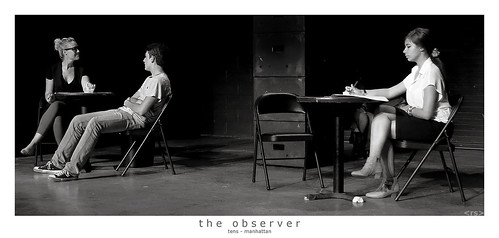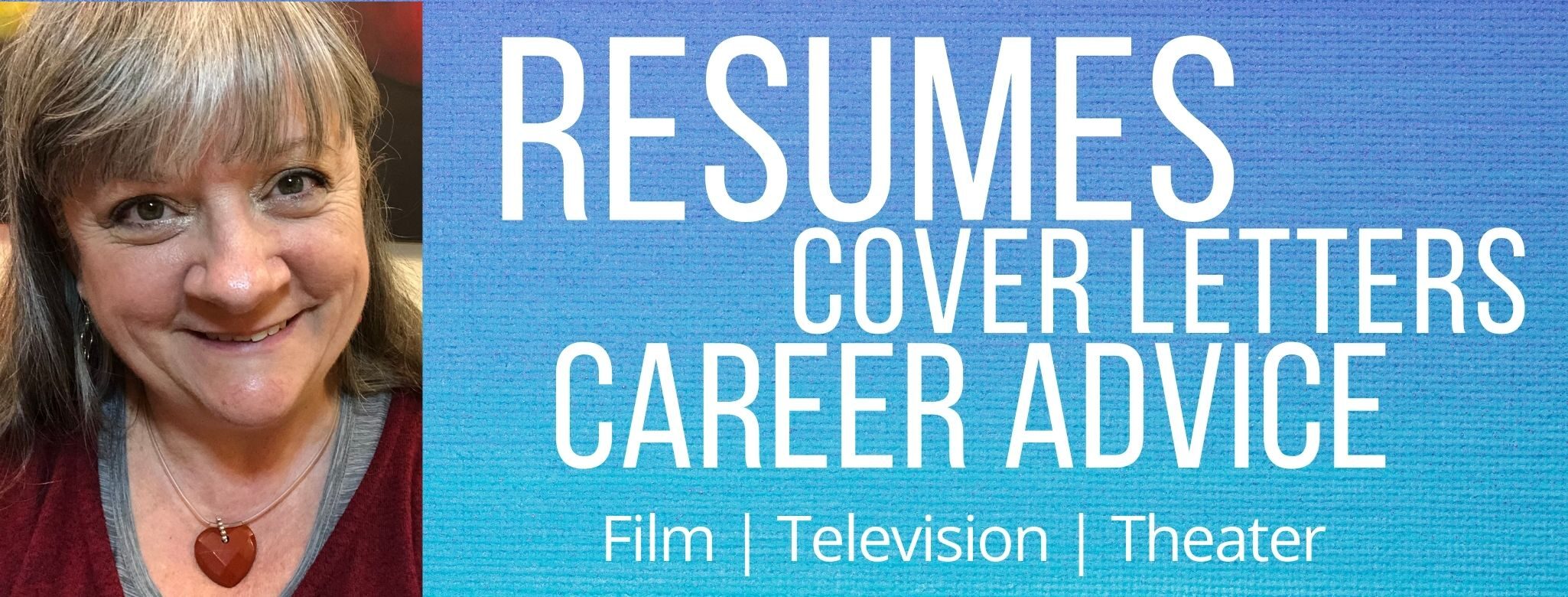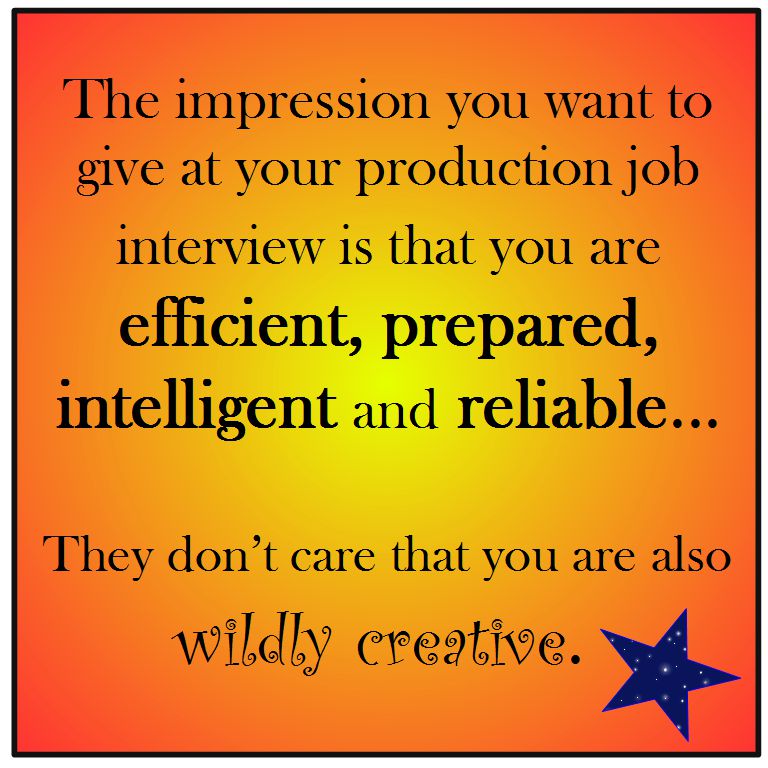Here in the US, film and theater can be some of the most casual work environments ever. The shlumpy person hanging around the production office in the rattiest jeans and oldest faded t-shirt is liable to be the Director. In Theater first names are usual amongst the stage crew, although I have heard in London’s West End the custom is to address everyone as Mr or Miss. On film sets people dress primarily for comfort and ease. I always address a person as Mr or Ms until I am told otherwise, especially the talent.
However knowing how casually dressed most people are on the job does not mean that you should be careless about your presentation in a job interview. In fact for Production or Development jobs at the Studios, usual Business Dress would apply, especially for job interviews. They don’t call the Executive Producers “Suits” for nothing.

Once you have been around a while you will earn the privilege of dressing a bit more wildly. But in the meantime, the impression you want to give at your entry level job interview is that you are efficient, prepared, intelligent and reliable. You want to be taken seriously. They don’t care that you are also wildly creative.
Here are my best tips for you when arriving at the production office for your interview:
- Hand your business card to the receptionist (often the Production Coordinator) when you say your name on arrival. Do I need to say be 10 minutes early?
- Bring a couple of extra copies of your Résumé, Cover Letter and References stapled together. Save them the time to photocopy more in case there are extra people in the interview. (If you have your portfolio on a disc, have a couple just in case).
- Don’t carry a big tote bag, backpack or briefcase, especially if you also have a portfolio. A simple folio for your extra paperwork is enough.
- Have ready in your hand a pocket sized notebook and pen or pencil – place these on the table in front of you, in case you need to make any notes.
- Turn your phone to silent and put it away while you are still in your car. Don’t be caught tweeting a selfie just as you are called in to the room. Many productions expect a high level of discretion from the crew.
- Clothing: for men (I got this from a super-professional lead man I used to know)
- A neat pair of jeans or khakis – belted
- A clean t-shirt tucked in with a pocket at the chest, or a camp shirt with a pocket – this is where you keep your pocket sized spiral bound notebook and pen
- A simple sweater or jacket if it is cold – not a hoodie or anything that needs to be pulled over the head
- Clean and tidy lace up running or walking shoes. (Save your work boots for the set if you are a Grip/Electrician)
- Clothing: for women
- A neat pair of jeans or pants or a simple skirt (not too short or full – not flirty)
- A neat blouse, or top – not too tight, not too low cut
- Sensible shoes (no stilletos or peep toes)
- Limited jewelry that doesn’t jingle (hard for me because I love bangles)
- A small purse (rather than a tote).
- A simple sweater or jacket if it is cold. Not a hoodie, or anything that needs to be pulled over the head.
- For theater interviews, I encourage dark clothing. Most of the time you will be asked to wear “blacks” backstage. Showing your comfort with dark clothes adds a layer of professionalism to your first impression.
- Sit up straight, but not on the edge of your chair.
Preparation
Read over your own cover letter before the interview. Chances are it is something you wrote that will inspire some of the questions. Especially be ready to reiterate how you know or met whoever it was that referred you for the job.
Research and be familiar with the work of the Director, and if possible the UPM and other Producers on the show. You won’t be showing off your knowledge unasked, but you must able to answer if they ask you if you have heard of that person’s work. It also affects how you will express your skills – a maverick who shoots on the run and values out of the box solutions needs to hear about your quick thinking; a traditional auteur studio director will want to hear about your attention to detail, calm demeanor and stamina.
They will almost certainly ask you if you have a reliable car. The answer should be an unqualified yes. If you only have access to your mom’s Pontiac, that is a potential problem, so don’t volunteer that info. You should also have proper car insurance.
Don’ts:
- Don’t wear a t-shirt from a movie, even one of their movies. You may be trying to be flattering, but it looks too kiss-ass. If the project was an unpleasant experience for them, reminding them of it does you no good. If it is someone else’s show, well….why? If they happen not to like it, again it does you no good.
- Don’t wear a baseball hat. You aren’t the Director.
- Don’t wear extreme faddish fashions – even to a music video shoot interview. Do look current, but don’t look like you are trying to outdo the stars in trendiness. I’m thinking of super low slung jeans, any kind of midriff baring crop top or any fashion involving lots of visible underwear. Once the shoot starts you will find your proper level – and you will likely find a lot of PA’s wearing shorts, flannels and layers (especially on location).
- Don’t bad mouth anyone, including on a prior project, regardless of what the interviewer may have heard. It is true that some shoots can end up notorious for various reasons. Don’t get caught up in gossip. Instead express your gratitude for the opportunity to have worked. Other useful words include “interesting”, “challenging”, “unexpected” and “a learning experience”. Or if they push for dirt, try vague puzzlement: “I didn’t have any problems.” (IF it strikes you that your prospective boss is an inveterate gossip, try “I’ll tell you about it sometime” with a wink. Make sure your stories are funny, self-deprecating and NOT mean spirited.)
- Don’t accept a refreshment at the start. All it takes is you spilling a coffee down your front to look like a total klutz. If you drink that bottle of water while you wait, half way through the interview you might need the bathroom, and will be giving off “discomfort vibes” the whole time. However, saying “I’ll take that bottle of water now please” to the person in reception just before you get ready to go, gives you the opportunity then to express your gratitude as the last thing that person will remember of you.
- Don’t use the “tell me about yourself” question as a reason to launch into a lengthy dissertation about your long term goals. Instead focus on your recent experience, using the features and benefits idea. Honestly when an interviewer says that, it’s often a sign that they are not good at asking interview questions. They might be the kind of person that knows what they don’t want, but only knows what they want when they see it. Try not to roll your eyes.
- Don’t use the phrase “people person”. In fact avoid clichés as much as possible.

Features and Benefits
In sales it is not enough to describe the features of the product; you also lead the customer to see the benefits to themselves of those features. When you practice your answers to questions, always add a benefit to the feature.
For example when you note that you were a PA on a student film, mention that you were chosen to wrangle 40 extras on that short, because you are super organized and patient. Chances are that you had to wear many hats on your own student thesis film, or during your internship. Mention what characteristics helped you with your duties – unruffled and calm, quick study, organized, ability to transition and then focus – or what you learnt and have now mastered – paperwork, research, invoices, local knowledge.
Asking Questions
I always used to hate it when they asked if I had any questions. I felt like a money grubber if I asked about money – although that is very important to know and ask. You have the absolute right to know what you will be paid.
I always had a hard time thinking of questions on the fly. If you are like me, learn from my mistakes – have your questions ready in your mind, and have practiced asking them aloud, if they have not already been covered.
For film productions, you will certainly want to know about the schedule – when they would like you to start, when principle photography will start, how long they expect to shoot, will they be travelling out of the zone (in LA), are they planning nights, are they planning location work (lots or little?) or studio/sound stage work, and if they are planning 10 or 12 hour days. This is when you would use your notebook.
For a theater staff job you might want to ask how long the season is, how many shows will be produced, if there will be other events between main shows – to get an idea of how much work you can expect. For a particular production, you will be asking about start dates, rehearsal time, tech week dates, and touring (including if you would join the touring company),
I would expect that they will have told you something about the show itself in the course of the interview, but if not you can ask about it. You might ask about the size of the crew, as an indirect way to get to the budget of the film.
Then you can ask about what pay they are offering, if there are any benefits or kit rental, and finally when you can expect a decision from them, and if someone will call you regardless of the result. Write down the date they mention, because if you don’t hear, that will be the day you call in.
After
Stand out from the crowd. Immediately send a hand written card thanking them, by name, for their time in the interview. Do this even if they already told you no, or if you don’t intend to accept their offer. There is always the next picture.
Let me know if these tips are helpful on my Facebook page.
Contact me below for help with your Résumé and Cover Letter.

